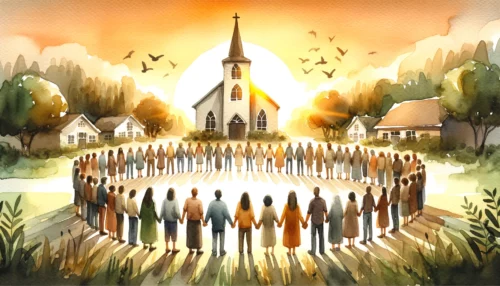There are times when our spiritual life feels more like a desert than a wellspring. We pray, but our prayers seem to bounce off the ceiling; we read the Bible, but the words seem lifeless. In these moments, we might be experiencing what’s often referred to as “spiritual burnout.” It’s a state of emotional, physical, and spiritual exhaustion where we feel disconnected from God. But this is not a cause for despair – rather, it’s an invitation to a journey of renewal and rest.
Understanding Spiritual Burnout
Spiritual burnout is a state where we experience a profound sense of fatigue and disconnection in our relationship with God. It’s like a dry season in our spiritual journey where our regular spiritual practices – such as prayer, reading the Bible, and attending church – seem more like chores than sources of comfort and joy.
This burnout is not a sign of spiritual failure or lack of faith. In fact, it’s something many Biblical characters experienced. For instance, Elijah, after a significant victory, found himself so overwhelmed that he wanted to end his life (1 Kings 19). Instead of reprimanding him, God provided him with rest and sustenance, showing His understanding and compassion in times of spiritual exhaustion.
The roots of spiritual burnout can be varied. Sometimes, it’s caused by external factors like excessive ministry work, personal life stressors, or challenging life events. At other times, it’s an internal struggle, perhaps due to a personal crisis of faith, unmet expectations of God, or unresolved sin that weighs heavy on the conscience.
In the New Testament, we find an instance where the Apostle Paul expresses his deep sorrow and continuous struggle (2 Corinthians 1:8-9). Here, Paul’s overwhelming circumstances led him to a point of despair. Yet, these experiences served to make him rely not on himself but on God who raises the dead.
Experiencing spiritual burnout doesn’t mean we are abandoned by God. Much like Job who faced immense suffering (Job 1-42), we might be in a place of pain and questioning, yet God remains present and active. God is not distant or uncaring in these moments, but rather, as revealed in the life of Jesus, He is a God who is familiar with our struggles and sufferings (Hebrews 4:15).
Understanding spiritual burnout is the first step toward overcoming it. It is a season of life that many of us will walk through, characterized by fatigue, disconnection, and a sense of dryness in our relationship with God. It can be due to a host of external or internal factors, and is not a sign of spiritual failure or lack of faith. Remember, God remains present and active even in these challenging seasons. As we face spiritual burnout, we need to remember that God is compassionate, understanding, and always ready to lead us towards renewal and rest.
Biblical Insights for Overcoming Spiritual Burnout
Our journey through the Bible provides us with abundant wisdom for overcoming spiritual burnout. One key theme that consistently surfaces is the importance of rest and renewal. From the creation story, God set the example of rest on the seventh day (Genesis 2:2-3). This wasn’t because God needed rest, but to demonstrate for us the rhythm of work and rest.
Jesus Himself, during His ministry on earth, often withdrew to lonely places to pray and rest (Luke 5:16). He recognized the need for solitude and communion with the Father, which recharged His spiritual batteries. In fact, Jesus even invited His disciples to come away with Him to a quiet place and get some rest (Mark 6:31). This shows that rest is not just a physical necessity, but a spiritual one as well.
Another crucial insight comes from the life of Moses. When he was overwhelmed by the task of leading the Israelites, his father-in-law Jethro advised him to delegate responsibilities (Exodus 18:13-23). This highlights the importance of not carrying burdens alone. Sharing responsibilities and leaning on the community can alleviate the strain that often leads to spiritual burnout.
We also find wisdom in the Psalms, where the psalmist often poured out his feelings of distress and disconnection to God (Psalm 42). These expressions of raw emotion show us that it’s okay to be honest with God about our struggles. Being authentic in our relationship with God can help us navigate the dry seasons in our spiritual journey.
In the face of spiritual burnout, the Apostle Paul reminds us that our outer self is wasting away, but our inner self is being renewed day by day (2 Corinthians 4:16). This encouragement serves as a reminder that even in our most challenging times, God is working in us. Our struggles don’t go to waste but are used by God to mold us and shape us in our spiritual journey.
In understanding how to overcome spiritual burnout, the Bible offers profound wisdom. It reminds us of the importance of rest, the value of community, the need for authenticity in our relationship with God, and the promise of inner renewal even in our most difficult times. These insights not only help us navigate through the seasons of spiritual burnout but also strengthen our faith, leading us towards a deeper understanding and experience of God’s love and grace.
Practical Steps for Renewal and Rest
With biblical wisdom in mind, let’s explore some practical steps we can take to overcome spiritual burnout and find renewal and rest:
- Prioritize time for rest and reflection: Make a conscious effort to set aside time for relaxation, reflection, and prayer. This can help restore our energy and deepen our connection with God (Matthew 11:28-30).
- Develop a balanced spiritual routine: Aim for a well-rounded spiritual life that includes prayer, Bible study, worship, and fellowship. Avoid overloading yourself with too many activities, as this can lead to burnout.
- Share your struggles with others: Lean on your church community, friends, and family for support and encouragement. Share your experiences and ask for prayer, as this can lighten your burden (Galatians 6:2).
- Seek professional help if needed: If your spiritual burnout is accompanied by anxiety, depression, or other mental health concerns, consider seeking help from a professional counselor or therapist, preferably one who shares your faith.
- Practice gratitude and mindfulness: Cultivate an attitude of thankfulness and be mindful of God’s presence in your daily life. This can help shift your focus from your struggles to God’s goodness (1 Thessalonians 5:18).
- Re-evaluate your commitments: Assess your current commitments and responsibilities, both within and outside the church. Determine which activities align with your priorities and values, and consider stepping back from those that don’t.
- Set healthy boundaries: Establish limits in your personal and ministry life, saying no when necessary. This can help prevent overextension and protect your physical, emotional, and spiritual well-being (Ephesians 5:15-16).
- Focus on God’s grace and love: Remember that your worth and identity are found in God’s love, not in your accomplishments or performance. Embrace God’s grace, knowing that you are loved and accepted just as you are (Ephesians 2:8-9).
By implementing these practical steps, we can actively work towards overcoming spiritual burnout and finding the renewal and rest we need. By making time for rest, developing a balanced spiritual routine, sharing our struggles, seeking help if needed, practicing gratitude, re-evaluating commitments, setting healthy boundaries, and focusing on God’s grace and love, we can experience the restoration and strength that comes from a deepened relationship with God.
Renewed Strength for the Journey Ahead
Our spiritual journey isn’t always a mountain top experience. There are valleys, deserts, and times of spiritual burnout. Yet, these seasons, while challenging, can serve as catalysts for growth, deepening our faith, and drawing us closer to God.
To further reflect on your spiritual journey, consider these questions:
- What current practices in your spiritual life may be contributing to feelings of burnout?
- How can you implement a rhythm of rest and renewal in your daily routine?
- What changes can you make in your commitments and responsibilities to prevent spiritual burnout?
Dry seasons don’t last forever. The God who created us, who knows our innermost being, is ever-present. He is the source of our strength and the wellspring of our joy. His grace is sufficient, His power made perfect in our weakness. So, let’s lean into His love, His grace, and His rest, knowing that in Him, we will find the renewal and rest our souls long for.














